Previewing Maxiotek's MK8115 SSD Controller: Can DRAM-less Drives Make The Cut?
by Billy Tallis on May 9, 2017 8:00 AM ESTATTO
ATTO's Disk Benchmark is a quick and easy freeware tool to measure drive performance across various transfer sizes.
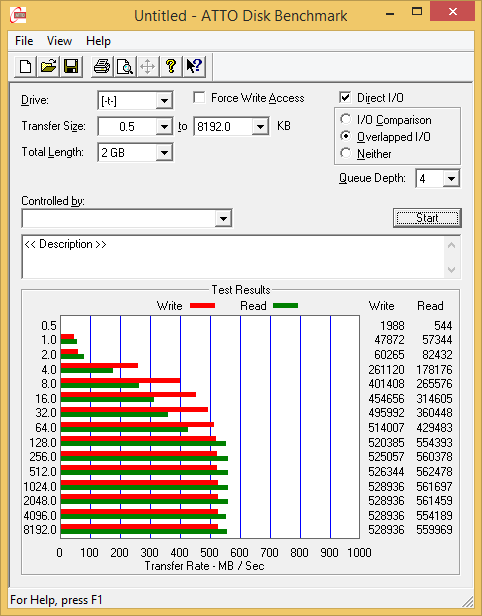 |
|||||||||
Both MK8115 drives have horrible performance on 512-byte transfers, far lower than anything else we've tested in recent memory. Reads are more than 100 times slower for 512B than 1kB transfers, and for writes the difference is a factor of 24. Most filesystems use 4kB or larger block sizes, but 512B accesses are still common enough that this is a fairly severe bug that needs to be dealt with in future firmware.
Beyond 512B transfers, the TLC drive's write speed scales up quicker than the MLC drive, but its read speeds struggle a bit. For 128kB and larger transfers, both drives are operating at full speed and performing similarly to each other and most SATA drives.
AS-SSD
AS-SSD is another quick and free benchmark tool. It uses incompressible data for all of its tests, making it an easy way to keep an eye on which drives are relying on transparent data compression. The short duration of the test makes it a decent indicator of peak drive performance.
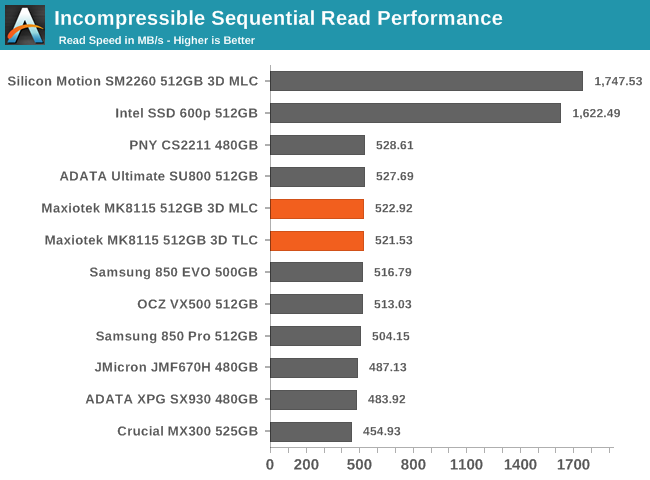
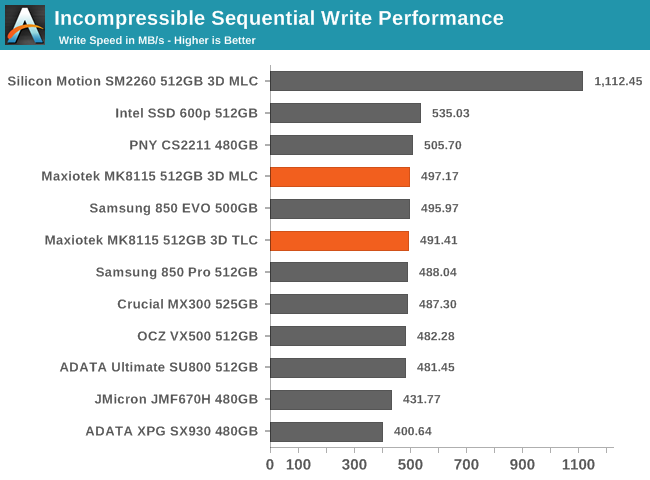
The MK8115 controller does make use of some compression, but its peak sequential read and writes speeds are not reliant upon the data being compressible. The MK8115 drives give AS-SSD performance that is typical for drives that are large enough to saturate the SATA link.
Idle Power Consumption
Since the ATSB tests based on real-world usage cut idle times short to 25ms, their power consumption scores paint an inaccurate picture of the relative suitability of drives for mobile use. During real-world client use, a solid state drive will spend far more time idle than actively processing commands. Our testbed doesn't support the deepest DevSlp power saving mode that SATA drives can implement, but we can measure the power usage in the intermediate slumber state where both the host and device ends of the SATA link enter a low-power state and the drive is free to engage its internal power savings measures.
We also report the drive's idle power consumption while the SATA link is active and not in any power saving state. Drives are required to be able to wake from the slumber state in under 10 milliseconds, but that still leaves plenty of room for them to add latency to a burst of I/O. Because of this, many desktops default to either not using SATA Aggressive Link Power Management (ALPM) at all or to only enable it partially without making use of the device-initiated power management (DIPM) capability. Additionally, SATA Hot-Swap is incompatible with the use of DIPM, so our SSD testbed usually has DIPM turned off during performance testing.
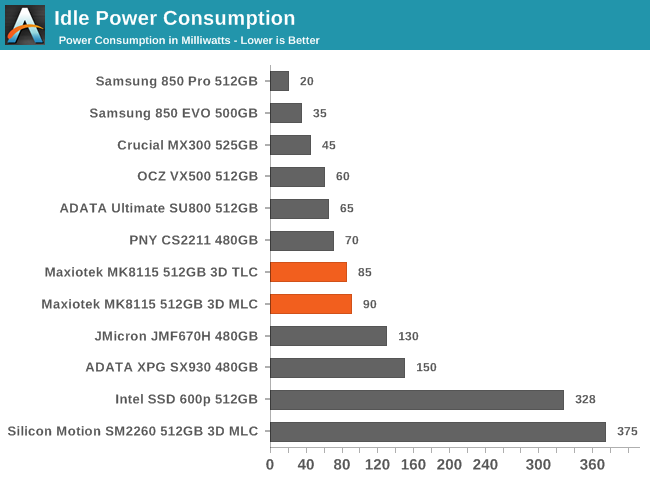
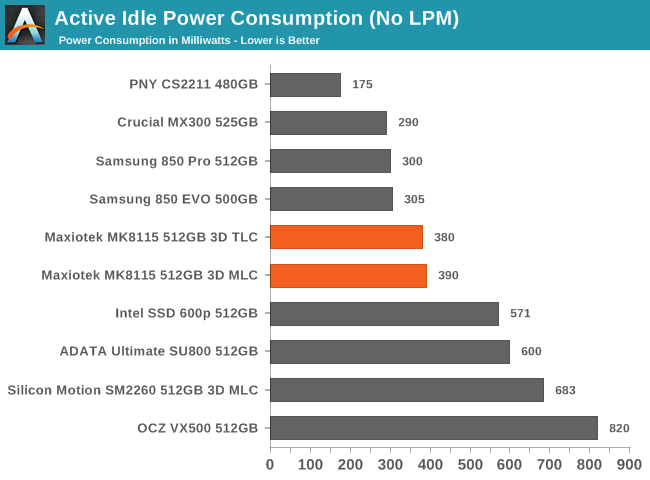
Idle power of the MK8115 is significantly improved over the JMF670H, but still lagging slightly behind the Phison-based PNY CS2211 and nowhere near the best SATA SSDs. Samsung and Marvell use more advanced lithography nodes for their controllers, and the smaller competitors on lagging fabrication processes can't beat them.
The active idle power consumption of the MK8115 drives is decent: it's clearly better than for the Silicon Motion drives or the OCZ VX500, but not quite as good as the Samsung and Marvell drives, nor the unusually efficient PNY CS2211.










60 Comments
View All Comments
jabber - Tuesday, May 9, 2017 - link
Its like Video Recorders or DVD players. The first ones weighed 30 kilos and were built like they were made during the Industrial Revolution. By the time they stopped making them they weighed 3 kilos, had 70% fewer parts and were mostly plastic.Magichands8 - Tuesday, May 9, 2017 - link
Yep! Prices are getting higher in many cases even if they aren't dropping AND performance is either mediocre or just getting worse. Like I've said before, somewhere there are people buying such products. I don't know who they are or what's wrong withe them but I guess manufacturers are going to continue the trend for as long these people have money to lose. Even though it's dismaying to see I won't have much trouble waiting them out though. There's just very little value in most current offerings.MajGenRelativity - Tuesday, May 9, 2017 - link
I'm not sure of an instance where performance has dropped in the same price band over the past couple of years. Please feel free to enlighten meBrokenCrayons - Tuesday, May 9, 2017 - link
I'm one of those people buying such things. In my case, I was using mechanical hard disks until the middle of last year and I'm slowly (due to unusually high NAND prices) purchasing low performance SSDs for my home computers. Cheap, relatively slow SSDs still let me enjoy faster and more responsive storage. Since I'm not a power user or someone that's interested in waving around my consumer electronics like they're an extension of my reproductive organs, I have no want or need for the fastest and most expensive tier of solid state storage.While you wonder what's wrong with us for our purchases, we wonder what's wrong with you for being worried about what we buy when you can simply mind your business and buy a higher end product meant to meet your needs or desires.
MajGenRelativity - Tuesday, May 9, 2017 - link
I definitely respect your choices, as even a low-end SSD can best a HDD for metrics a typical home user would care about.melgross - Tuesday, May 9, 2017 - link
Right now, there are memory shortages. NAND shortages are expected to last until the end of the year. Then prices will begin dropping again.beginner99 - Wednesday, May 10, 2017 - link
Yeah if this continues it will take less than a year and they will actually manage to perform worse than HDDs.JimmiG - Wednesday, May 10, 2017 - link
I agree, unless you absolutely need more SSD storage right now, I'd recommend holding off until next year.MajGenRelativity - Tuesday, May 9, 2017 - link
I just hope the shortage is going to end, and we can go back to cheaper SSDs. I'm also unsure of the usefulness of this drive, but I can see it being used in systems a notch above budget systems.looncraz - Tuesday, May 9, 2017 - link
I just want a 2TB SSD that costs $200 US and performs better than a hard drive (no spin up delays, lower latency, no moving parts).I could deal with 150MB/s transfer rates and even 2ms latencies for that. Still worlds better than the hard drives I use for storage now considering I have to spin them down as they are only accessed every few hours a couple times a day (but then stream data at 40MB/s+ for a couple hours).
I would buy three without hesitation.